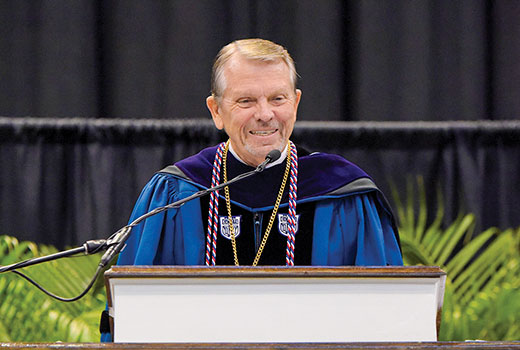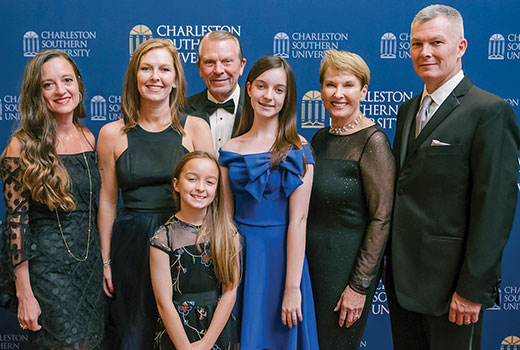When Jairy Hunter became president of Baptist College of Charleston in the summer of 1984, the school faced the prospect of closing its doors.
An editorial in The Baptist Courier a few months earlier described how the institution, the only Baptist-affiliated college in the lower half of the state, was heavily encumbered with long-term debt. Nonetheless, the 19-year-old college belonged to all South Carolina Baptists, the editorial stated, along with this: “We can hardly be blamed for the school’s dilemma, but our choices now are only whether to help save it or stand by and watch it die.”
Hunter, who was vice chancellor for development and business for the University of North Carolina, Wilmington, accepted the job at Baptist College.
The state convention threw its support behind him and the school by guaranteeing loans and allowing Hunter to solicit funds directly from churches. Twenty-five churches pledged $25,000 each for the school’s “Towards Excellence” campaign.
Thirty-four years later, Hunter is retiring from the presidency of a university that has operated in the black for 32 of his 34 years, and he leaves behind a legacy of institutional change, success and growth. Hunter, who recently was named president emeritus at the school’s commencement service, plans to continue teaching business classes at CSU.
Things were vastly different three decades ago. In the spring of 1984, Hunter and his wife, Sissy, were driving away from the campus after his interview for the president’s job. She turned and looked back toward the school’s chapel, still under construction, and felt “as though we were leaving a child.”
“It was then that I turned to Jairy and told him I truly believed it was right for us to make this college our home,” she said. “I remember thinking during his interview how the job description read as though it was written directly from his résumé. That feeling grew stronger, and so did the feeling that we were being called here.”
The early years of Hunter’s administration were filled with question marks and uncertainty. It was a time of regaining the public’s trust, of long days and nights on the road raising money, and working with faculty, students, alumni, staff and coaches to put the university on the path toward success.
“When I first came to [Baptist College], the future of the institution was uncertain,” Hunter said. “I remember the day when I gave my inaugural address, saying that I had a vision of an institution on the threshold of a great future.”
He was forced to make some difficult decisions. Budgets had to be balanced. Staff had to be cut. Huge debts had to be restructured, and relationships had to be mended.
Hunter met the institution’s problems head on. He developed a three-phase strategic plan. “First, we had to survive. Next, we had to stabilize, and then we began to strive for excellence,” said Hunter. The university moved through the phases between 1984 and 1999. Today, CSU’s integrated strategic planning process is recognized as a model for institutions of higher education.
“Our achievements were a direct result of prayer, God’s grace, strategic planning, exemplary leadership of our trustees, generous financial support of our friends, outstanding teaching and advising by our faculty and the extra efforts of key administrators, staff and coaches,” he said.
Hunter said he found his purpose at CSU. “I honestly did not realize at the time I was hired that the Lord had been preparing me through various academic and business experiences to serve in Christian higher education,” he said. “However, as years passed, it became evident that serving as president of Charleston Southern University was God’s will for me.”
Gary Hollingsworth, executive director-treasurer of the South Carolina Baptist Convention, said Hunter has set a “high standard” for all of the convention’s ministry partners. “His leadership skills, passion for Christian higher education and consistent focus on keeping Charleston Southern University tightly tethered to the gospel of Jesus is what makes the partnership with the South Carolina Baptist Convention work,” said Hollingsworth. “His long-term influence will live far beyond his 34 years of service.”
Don Kirkland, retired editor of The Baptist Courier, was a boyhood friend of Hunter and later served alongside him for many years in South Carolina Baptist denominational work. He said his friend’s presidency at Charleston Southern University “is due both praise and appreciation from South Carolina Baptists.”
“During times of challenge and opportunity, his steady hand at the helm has advanced the cause of Christian higher education at the school,” Kirkland said.
Hunter’s retirement as CSU president also is a time of reflection for Kirkland as he thinks back to a friendship of some 65 years.
In the early 1950s, Kirkland’s family moved from Fort Worth, Texas, to the community of Elgin, just outside Lancaster. Kirkland’s dad had been called as pastor of Elgin Baptist Church. The Hunters were faithful leaders in the church and lived just across the road from the parsonage.
“Our families spent many hours together, especially in the evenings because they had a television and we did not, at least not right away,” said Kirkland.
“As I give thought to the retirement of Jairy Hunter at Charleston Southern, my mind returns to those wonderful days of our youth in the little community of Elgin, where I called him ‘Buddy’ and he called me ‘Donny.’ In fact, he still does, and I hope he always will.”
Hunter said he has “grown in [his] walk with the Lord” through serving at CSU and he has been blessed to have the opportunity to work in a Christian environment. “I rejoice mostly in seeing numerous students finding God’s will for their lives while studying at CSU,” he said.
When he accepted the job of president, Hunter thought he would assist the board of trustees for three years and then return to the University of North Carolina system. By year three, the school was in the black and financially stable. “The board asked me to stay three more years, so I did,” he said.
“In 1989, my mother died. At the funeral, my nephew read from her diary. My mother wrote that she and my father prayed for one of their children to be in Christian service. Four months later, after much prayer, I realized that God had truly called me to be the president of Charleston Southern University.”
Hunter said he would like to be remembered as a servant leader whose life was fulfilled “because I found God’s will for my life.”
— By Butch Blume, managing editor; Jenna Johnson, CSU assistant director of integrated marketing; and Jan Joslin, CSU director of publications.

